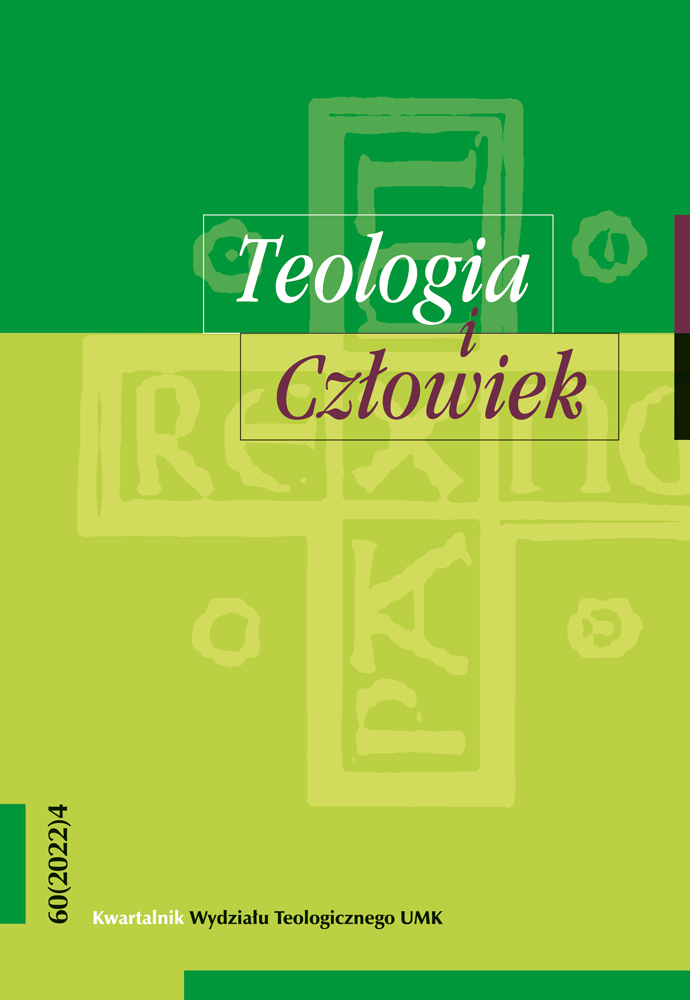Znaczenie wiary w procesach wychowania i nauczania w świetle Listu do diecezji rzymskiej o pilnej potrzebie wychowania papieża Benedykta XVI
DOI:
https://doi.org/10.12775/TiCz.2022.023Słowa kluczowe
wiara, chrześcijaństwo, wychowanie, nauczanieAbstrakt
Koncepcja wychowania i nauczania w ujęciu papieża Benedykta XVI stanowi szczególną wartość i inspirację do podejmowania dyskusji na temat współczesnego wychowywania i nauczania w rodzinach, szkołach, instytucjach o charakterze pedagogicznym. Jego koncepcja zbudowana jest na gruncie wielkiej tradycji pedagogicznego myślenia w Kościele katolickim, a zarazem wpisuje się w aktualne uwarunkowania egzystencjalne współczesnych ludzi. Dla Benedykta XVI istotne znaczenie w procesach wychowania i nauczania chrześcijańskiego ma wiara i jej rys osobowy. Papież w Liście do diecezji rzymskiej o pilnej potrzebie wychowania wskazuje na konkretne warunki wychowania chrześcijańskiego, zarówno w odniesieniu do wychowywanych\nauczanych, jak i wychowujących\nauczających, a są nimi: bliskość i zaufanie, wielkie pytanie o prawdę, zdolność do miłości, znalezienie właściwej równowagi między wolnością i dyscypliną, autorytet, poczucie odpowiedzialności i niezawodna nadzieja. Według papieża Benedykta XVI pełna edukacja, powinna zatem opierać się na bezpośrednim i osobowym spotkaniu z człowiekiem, na świadectwie, na autentycznym przekazie wiary, nadziei i miłości oraz wypływających z nich wartości.
Bibliografia
Adamski, Franciszek. „Personalistyczna wizja osoby jako podmiotu wychowania – jej prawa i wynikające stąd dyrektywy wychowawcze.” W Podmiotowość w wychowaniu. Między ideą a realnością. Redakcja Ewa Kubiak-Szymborska, 179–184. Bydgoszcz: Wydawnictwo „WERS”, 1999.
Adamski, Franciszek. „Wprowadzenie: personalizm – filozoficzny nurt myślenia o człowieku i wychowaniu.” W Wychowanie personalistyczne. Wybór tekstów. Redakcja Franciszek Adamski, 9–19. Kraków: Wydawnictwo WAM, 2005.
Attard, Fabio. „L’emergenza educativa. L’impegno della Chiesa e il recente Magistero Cattolico.” W Di fronte alla sfida educativa. Emergenza o cosa di cuore?, a cura di Velleda Bolognari, Francesco Gatto, Giovanni Russo. 57. Messina: Coop. S.Tom.; Torino: Elledici, 2010.
Benedykt XVI. Encyklika „Spe salvi”. Kraków: Wydawnictwo M, 2007.
Benedykt XVI, „List do diecezji rzymskiej o pilnej potrzebie wychowania (Watykan 21.01.2008).” L’Osservatore Romano, wydanie polskie 29, no. 4 (2008): 4–6.
Benedykt XVI, „Modlitwa niedzielna z Papieżem. Bóg jest Panem świata. 27.01.2008.” L’Osservatore Romano, wydanie polskie 29, no. 3 (2008): 56–57.
Benedykt XVI. „Przemówienie do biskupów ze Stanów Zjednoczonych Ameryki 19.01.2012. Świadectwo Kościoła ma charakter publiczny.” L’Osservatore Romano, wydanie polskie 33, no. 3 (2012): 15–16.
De Beni, Michele. „Mieć odwagę być wychowawcami dzisiaj.” W Wychowanie chrześcijańskie. Między tradycją a współczesnością, redakcja Alina Rynio, 61–69. Lublin: Wydawnictwo KUL, 2007.
Chrobak, Stanisław. „Troska i wychowanie nowych pokoleń. Benedykt XVI o potrzebie wychowania.” Seminare 27 (2010): 127–136. https://czasopisma.uksw.edu.pl/index.php/s/issue/view/860/215.
Kantowski, Krzysztof. „Kształtowanie pojęć w kontekście itinerarium wiary.” Colloquia Theologica Ottoniana 1 (2014): 119–134. https://wnus.edu.pl/cto/pl/issue/583/article/9175/.
Kiereś, Barbara. „Kultura chrześcijańska wobec postmodernistycznej ideologii «anty» w pedagogice.” W Wychowanie chrześcijańskie. Między tradycją a współczesnością, redakcja Alina Rynio, 91–102. Lublin: Wydawnictwo KUL, 2007.
Kość, Stanislav. „Idea rozwoju człowieka – wkład nauki społecznej Kościoła w integralną wizję wychowania.” W Religijno-moralny wymiar rozwoju i wychowania, redakcja Alina Rynio et al., 39–56. Lublin: Wydawnictwo KUL, 2012.
Kunowski, Stefan. Podstawy współczesnej pedagogiki. Warszawa: Wydawnictwo Salezjańskie, 1993.
Marek, Zbigniew. „Wychowanie religijno-moralne.” W Religijno-moralny wymiar rozwoju i wychowania, redakcja Alina Rynio et al., 21–38. Lublin: Wydawnictwo KUL, 2012.
Michałowski, Stanisław Czesław. „Kategorie edukacyjne w pedagogii współbycia osobowego.” W Wychowanie chrześcijańskie. Między tradycją a współczesnością, redakcja Alina Rynio, 180–210. Lublin: Wydawnictwo KUL, 2007.
Nagy, Stanisław. „Czytając Spe salvi – wielka nadzieja.” Niedziela. Wydanie ogólnopolskie 7 (2008): 4–5. https://www.niedziela.pl/artykul/84642/nd/Czytajac-%E2%80%9ESpe-salvi---wielka-nadzieja.
Nowak, Antoni J. „Człowiek – istota religijna. Aspekt psychologiczny.” Śląskie Studia Historyczno-Teologiczne 18 (1985): 203–208. https://bazhum.muzhp.pl/media//files/Slaskie_Studia_Historyczno_Teologiczne/Slaskie_Studia_Historyczno_Teologiczne-r1985-t18/Slaskie_Studia_Historyczno_Teologiczne-r1985-t18-s203-208/Slaskie_Studia_Historyczno_Teologiczne-r1985-t18-s203-208.pdf. http://www.wtl.us.edu.pl/e107_plugins/wtl_ssht/index.php?numer=18&str=203-208.
Nowak, Marian. „Historyczny i społeczny kontekst wychowania w duchu chrześcijańskim.” W Wychowanie chrześcijańskie. Między tradycją a współczesnością, redakcja Alina Rynio, 33–36. Lublin: Wydawnictwo KUL, 2007.
Nowak, Marian. Teorie i koncepcje wychowania. Warszawa: Wydawnictwa Akademickie i Profesjonalne, 2008.
Okoń, Wincenty. Nowy słownik pedagogiczny. Warszawa: Wydawnictwo Akademickie „Żak”, 2007.
Solak, Adam. Wychowanie chrześcijańskie i praca ludzka. Warszawa: Wydawnictwo Uniwersytetu Kardynała Stefana Wyszyńskiego, 2004.
Starnawski, Witold. „Doświadczenie prawdy i jego znaczenie w wychowaniu.” W Wychowanie chrześcijańskie. Między tradycją a współczesnością, redakcja Alina Rynio, 317–330. Lublin: Wydawnictwo KUL, 2007.
Sztaba, Mariusz. Benedykt XVI. „Aby na nowo odkryć radość w wierze”. Antologia papieskich wypowiedzi na temat wiary, wątpienia i ateizmu. Warszawa: Oficyna Wydawniczo-Poligraficzna ADAM, 2014.
Pobrania
Opublikowane
Jak cytować
Numer
Dział
Licencja
Prawa autorskie (c) 2023 Grzegorz Kaczorowski

Utwór dostępny jest na licencji Creative Commons Uznanie autorstwa – Bez utworów zależnych 4.0 Międzynarodowe.
CC BY ND 4.0. Posiadaczem prawa autorskiego (Licencjodawcą) jest Autor, który na mocy umowy licencyjnej udziela nieodpłatnie prawa do eksploatacji dzieła na polach wskazanych w umowie.
- Licencjodawca udziela Licencjobiorcy licencji niewyłącznej na korzystanie z Utworu/przedmiotu prawa pokrewnego w następujących polach eksploatacji: a) utrwalanie Utworu/przedmiotu prawa pokrewnego; b) reprodukowanie (zwielokrotnienie) Utworu/przedmiotu prawa pokrewnego drukiem i techniką cyfrową (e-book, audiobook); c) wprowadzania do obrotu egzemplarzy zwielokrotnionego Utworu/przedmiotu prawa pokrewnego; d) wprowadzenie Utworu/przedmiotu prawa pokrewnego do pamięci komputera; e) rozpowszechnianie utworu w wersji elektronicznej w formule open access na licencji Creative Commons (CC BY-ND 3.0) poprzez platformę cyfrową Wydawnictwa Naukowego UMK oraz repozytorium UMK.
- Korzystanie przez Licencjobiorcę z utrwalonego Utworu ww. polach nie jest ograniczone czasowo ilościowo i terytorialnie.
- Licencjodawca udziela Licencjobiorcy licencji do Utworu/przedmiotu prawa pokrewnego nieodpłatnie na czas nieokreślony
PEŁEN TEKST UMOWY LICENCYJNEJ >>
Statystyki
Liczba wyświetleń i pobrań: 440
Liczba cytowań: 0



